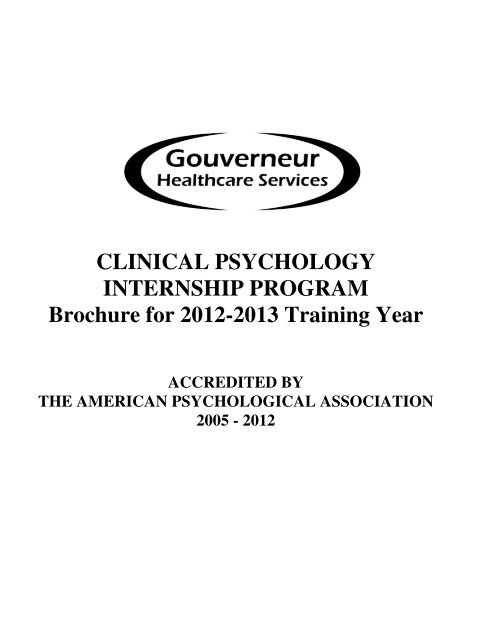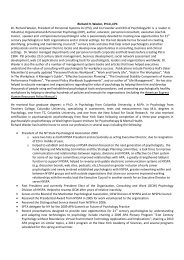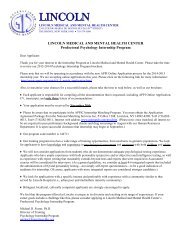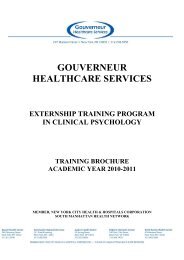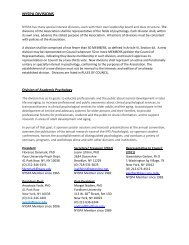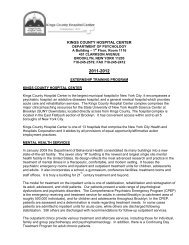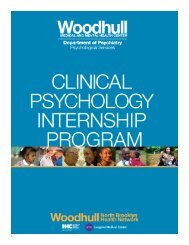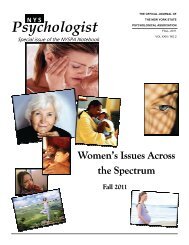CLINICAL PSYCHOLOGY INTERNSHIP PROGRAM Brochure for ...
CLINICAL PSYCHOLOGY INTERNSHIP PROGRAM Brochure for ...
CLINICAL PSYCHOLOGY INTERNSHIP PROGRAM Brochure for ...
Create successful ePaper yourself
Turn your PDF publications into a flip-book with our unique Google optimized e-Paper software.
<strong>CLINICAL</strong> <strong>PSYCHOLOGY</strong><br />
<strong>INTERNSHIP</strong> <strong>PROGRAM</strong><br />
<strong>Brochure</strong> <strong>for</strong> 2012-2013 Training Year<br />
ACCREDITED BY<br />
THE AMERICAN PSYCHOLOGICAL ASSOCIATION<br />
2005 - 2012
THE GOUVERNEUR HEALTHCARE SERVICES<br />
<strong>CLINICAL</strong> <strong>PSYCHOLOGY</strong> <strong>INTERNSHIP</strong> TRAINING <strong>PROGRAM</strong><br />
AN APA-ACCREDITED <strong>PROGRAM</strong><br />
MEMBER of NEW YORK CITY HEALTH & HOSPITALS CORPORATION<br />
Gouverneur Healthcare Services, in professional affiliation with New York University School of<br />
Medicine, provides a major portion of the outpatient health services <strong>for</strong> the Lower Manhattan area of<br />
New York City. Lower Manhattan has been the center of successive waves of immigration and is<br />
characterized by a broad diversity of ethnic, linguistic, and racial groups. It includes large numbers of<br />
non-English speaking immigrants of Latino/a, Chinese, Italian, African-Caribbean origin as well as<br />
African-Americans and a long-standing Jewish community. The broad diversity of this patient<br />
population challenges our Department of Behavioral Health to provide much needed mental health<br />
services in a culturally relevant and sensitive fashion. The stresses of acculturation, poverty, and<br />
discrimination place our patient population at high risk <strong>for</strong> physical illness and psychological<br />
disturbance. The Gouverneur catchment area has been officially designated as a poverty area by the<br />
Office of Economic Opportunity and has the second highest incidence of state psychiatric<br />
hospitalizations in New York City. Despite the continued influx of new immigrant groups and areas of<br />
gentrification, there is stability to the area, which attracts a largely family-oriented population, which<br />
uses the services of the hospital <strong>for</strong> its many health care needs.<br />
The Department of Behavioral Health saw a significant expansion of its clinical programs beginning in<br />
the early 1980's. Gouverneur’s tradition of outreach and mobile crisis intervention to the Lower East<br />
Side community continues and expanded to meet the needs of specific patient populations, such as<br />
young adults with severe and persistent mental illnesses and the isolated impaired elderly. Additionally,<br />
Gouverneur has implemented the Asian Bicultural Clinic, a unique program geared to meeting the<br />
mental health needs of the multilingual Chinese community. This program brings together several<br />
components to provide culturally-centered care by interdisciplinary multilingual and bicultural staff.<br />
In addition to implementing innovative clinical services, the psychology staff is encouraged to pursue<br />
their own training as mental health professionals and to actively participate in the clinical training of all<br />
disciplines. On-going training is offered to psychology interns and externs, social work interns, mental<br />
health counselors and nurse practitioners.<br />
The Psychology Service functions within the Department of Behavioral Health at Gouverneur<br />
Healthcare Services. The staff, at present, is comprised of nine full-time, and two part-time<br />
psychologists. Specialties of the staff include various <strong>for</strong>ms of psychodynamic psychotherapy, family<br />
systems therapy, dialectical behavior therapy, stress and pain management, cognitive-behavioral<br />
therapy, inpatient and outpatient group psychotherapy, and child psychotherapy. Psychologists are<br />
assigned to many of the units within the Department, including the Adult Service, the Women’s<br />
Comprehensive Health Program (WP), the Child and Adolescent Service (C&A), the Young Adult<br />
Outreach Team (YAOT), the Center <strong>for</strong> Older Adults and their Families (CFOA), and the Asian<br />
Bicultural Clinic (ABC). Staff members per<strong>for</strong>m a variety of functions, including conducting intakes,<br />
psychotherapy, psychodiagnostic evaluations, teaching seminars, and providing supervision. A primary<br />
component of the Psychology Service is the Clinical Psychology Internship Training Program, which is<br />
committed to training clinical psychology interns as part of the requirements <strong>for</strong> their doctoral degrees.<br />
1
<strong>INTERNSHIP</strong> MISSION STATEMENT<br />
The Gouverneur Clinical Psychology Internship offers Psychologists-In-Training an intensive and<br />
wide-ranging clinical and educational experience firmly rooted in multi-cultural values and community<br />
service. The primary emphasis of the year-long internship program is the professional development of<br />
the psychology practitioner.<br />
TRAINING <strong>PROGRAM</strong> & TRAINING GOALS<br />
Through a variety of training experiences, interns are exposed to the field of clinical psychology, both<br />
as a science and as a profession. The training program provides an opportunity to gain proficiency in an<br />
array of clinical modalities and therapeutic and assessment techniques, while serving a population that<br />
encompasses a broad variety of ages, cultures, religions, sexual orientations and diagnostic groups.<br />
Interns conduct intakes, provide treatment, and present cases at disposition meetings and<br />
multidisciplinary case conferences. By the end of the training year, Gouverneur interns are expected to<br />
have acquired the skills, knowledge, and flexibility to confront - proficiently, ethically and creatively -<br />
the challenges of an exciting and rapidly changing profession in a community mental health clinic<br />
setting.<br />
Structure of Internship Program:<br />
Integration of clinical training from all services. Throughout the year, interns conduct initial<br />
screenings of children and families and carry psychotherapy cases from most of the clinics and<br />
programs in the department -- Adult, Child and Adolescent, Older Adult Clinic, Women’s Program,<br />
Dialectical Behavior Therapy, etc. -- thus giving them ample exposure to all services and to a diverse<br />
population. This structure is in keeping with the departmental unified clinical and administrative<br />
structure <strong>for</strong> these clinics and programs. Interns also attend case disposition meetings <strong>for</strong> new patients,<br />
interdisciplinary and psychology staff meetings, and clinical case conferences and seminars.<br />
Ongoing Activities<br />
Throughout the training year interns participate in the following activities:<br />
1. Intakes: Interns are assigned adult and child initial screenings throughout the year.<br />
Screening responsibilities include a thorough psychosocial history, mental status<br />
examination, comprehensive risk assessment, DSM diagnosis, and initial treatment plan.<br />
Interns develop a knowledge of community resources through routinely referring out<br />
patients who do not meet admissions criteria in the department. As part of the screening<br />
process, interns also present their cases at a disposition team meeting.<br />
2. Assessment and Testing: Through ongoing assignments, interns refine their skills in<br />
clinical observation, diagnostic interviewing, cognitive abilities testing, and the use of<br />
objective and projective instruments. The dynamics of patients' presenting problems are<br />
also explored and integrated in the context of familial, cultural, and socio-political factors.<br />
Interns are made familiar with the administration and interpretation of culturally-sensitive<br />
2
tests. Spanish-language versions of the Vineland II, the PAI and the PAI-A are available <strong>for</strong><br />
bilingual assessment, as are the Bateria-III and Neuropsi (neuropsychological tests <strong>for</strong><br />
Spanish-speaking clients). Interns are assigned psychological testing cases referred from<br />
within the Department of Behavioral Health. For ongoing supervision and training in<br />
psychological assessment, interns attend a biweekly assessment seminar and group<br />
supervision with both didactic and rotating case presentation components. Each intern is<br />
also assigned a supervisor <strong>for</strong> each testing case assignment. Testing referrals may include<br />
psychodiagnostic, neuropsychological screening, developmental assessments, and<br />
assessments of learning disabilities, and are conducted in the patient’s preferred language<br />
when possible.<br />
3. Psychotherapy: Interns carry child, adult, and geriatric short-term and long-term<br />
individual and group psychotherapy cases throughout the training year. Interns are<br />
encouraged to conduct psychotherapy from a variety of theoretical approaches, including<br />
psychodynamic, relational, cognitive-behavioral, dialectical-behavioral, solution-focused,<br />
and experiential therapies. Interns are introduced to a variety of mind/body practices<br />
(mindfulness, stress management, yoga) used in conjunction with psychotherapy. A<br />
commitment to culturally-centered awareness, knowledge, and skill development permeates<br />
the internship training. In addition, interns conduct time-limited, solution-focused and/or<br />
process-oriented psychotherapy groups in English, Spanish, or Chinese dialects. Interns also<br />
carry family therapy cases utilizing a variety of theoretical perspectives.<br />
4. Supervision: Weekly supervision sessions are scheduled with members of the psychology<br />
staff, in both individual and group <strong>for</strong>mats. Approximately six to eight hours per week are<br />
devoted to individual and group supervision, including clinical conferences and training<br />
workshops. At the beginning of the training year, each intern is assigned a Mentor and a<br />
Primary Supervisor. Mentors and Primary Supervisors work closely with each intern not<br />
only in supervising clinical work but also to develop and monitor training goals and interns’<br />
professional development. Interns also work with other supervisors from the Psychology<br />
Service on a case-by-case basis.<br />
5. Seminars and Conferences: Members of the psychology staff conduct seminars directed<br />
toward the training needs of interns. Staff, interns, and trainees from other disciplines (such<br />
as social work) may be included, thus providing psychology interns with added stimulation<br />
and exposure to interdisciplinary training. Seminars generally have an emphasis on<br />
exposing interns to practical models and approaches particularly relevant to the patient<br />
populations that the department serves. Seminars and case conferences are conducted on a<br />
weekly basis and cover different psychotherapy approaches, psychodiagnostic testing,<br />
special issues in adult and child treatment, work with severely and persistently mentally ill<br />
clients, and multicultural issues.<br />
Interns attend in-service meetings of the Psychology Service and of the Behavioral Health<br />
Grand Rounds, where clinical cases and theoretical issues are presented by staff and invited<br />
guests. Interns have opportunities to present their own research at Gouverneur, and every<br />
year are expected to make a group presentation at one of Gouverneur’s Grand Rounds.<br />
3
6. Research: With approval from the Director of Training, there may be opportunities <strong>for</strong><br />
interns to undertake individual research projects, in collaboration with members of the<br />
Psychology Service. A group of psychologists meet as needed to discuss and work on<br />
ongoing research projects, and interns are invited to attend these meetings. The Psychology<br />
Service has access to the online NYU Ehrman Medical Library facilities, an invaluable<br />
resource <strong>for</strong> the latest in scientific and professional research publications.<br />
Description of Behavioral Health Services<br />
Adult Service provides assessment and treatment in both Spanish and English to adults ages 18<br />
and older. Services include complete psychosocial assessment, psychiatric evaluation,<br />
psychological testing, individual and group psychotherapy, art therapy, crisis intervention, and<br />
family therapy. Patients with a full range of psychiatric diagnoses, including severe mental<br />
illness, are seen in the clinic. The staff includes psychologists, psychiatrists, clinical social<br />
workers, a nurse and a nurse practitioner. This is a full year placement required <strong>for</strong> all interns.<br />
Asian Bicultural Clinic (ABC) serves primarily Chinese-speaking patients of all ages from age<br />
5 to older adults. ABC is staffed by a dedicated multidisciplinary team who is culturally<br />
knowledgeable and each member can speak at least two of the four Chinese dialects spoken in<br />
the Chinese communities. ABC receives most of their referrals from the Ambulatory Medical<br />
Care of Gouverneur, local schools, and maintains a close collaboration with the Asian Inpatient<br />
Unit (18 South) of Bellevue Medical Center in order to coordinate and facilitate comprehensive<br />
and continuous care. ABC staff provides pharmacotherapy and a gamut of therapy approaches<br />
including CBT, Filial therapy, Theraplay, and Integrative therapy and has adapted them with<br />
cultural sensitivity to the population. This is a required full year placement <strong>for</strong> trainees who are<br />
Chinese bilingual or multilingual.<br />
Child and Adolescent Service (C&A) is staffed with a psychologist, two psychiatrists, and<br />
social workers, who provide comprehensive outpatient care to families with children up to<br />
eighteen years of age who have emotional, social and/or behavioral problems. Services include<br />
evaluation <strong>for</strong> treatment, individual, family and group therapy, parent counseling,<br />
pharmacological treatment and psychological testing. This is a full year placement required <strong>for</strong><br />
all interns. Each intern spends a 3 month rotation attending the C&A weekly team meeting.<br />
Center <strong>for</strong> Older Adults and Their Families (CFOA) provides ongoing outpatient individual,<br />
group, and family psychotherapy treatment <strong>for</strong> adults 55 years and older and their families in<br />
coping with the problems and challenges of later life. This includes empowering them to solve<br />
their problems more effectively. Outpatient CFOA treatment may focus on recreation and<br />
activity-oriented therapies, crisis intervention, nutrition counseling and medical care<br />
coordination. Psychological assessment focusing on geriatric issues, including dementia<br />
screenings, is also available. A multi-ethnic team of clinicians provide services in English,<br />
Spanish, and Chinese dialects. Interns are assigned geriatric outpatient CFOA patients<br />
throughout their internship year<br />
4
Additionally, Continued Day Treatment Program (CDTP) is an outpatient comprehensive day<br />
treatment program <strong>for</strong> adults who are 55 years and older and diagnosed with a mental disorder.<br />
CDTP provides psychiatric consultations and group psychotherapy <strong>for</strong> mental health<br />
stabilization as well as addressing aging-related issues and enhancing socialization skills. There<br />
may be a possibility to participate in the Day Treatment Program, but this is not guaranteed .<br />
Dialectical Behavior Therapy Program is a group of clinicians committed to conducting<br />
dialectical behavior therapy with adult patients with borderline personality disorder as well as<br />
other patients with chronic emotional instability or personality disorders. The team has been<br />
developed by four psychologists who completed intensive training in DBT. The program<br />
currently has three DBT skills groups (one in Spanish) that psychology trainees (interns or<br />
externs) lead themselves or co-lead with psychology staff. Interns attend a DBT consultation<br />
team meeting on a weekly basis, co-lead a skills group during at least part of the year and are<br />
assigned individual DBT cases under supervision by a DBT-trained clinician. DBT is a year<br />
long placement <strong>for</strong> interns. (Interns are expected to read 1 and familiarize themselves with M.<br />
Linehan’s Cognitive Behavioral Treatment of Borderline Personality Disorder and her Skills<br />
Training Manual <strong>for</strong> Treating Borderline Personality Disorder.)<br />
The Mobile Crisis Unit (MCU) is designed to provide rapid response to psychiatric crises & to<br />
resolve or ameliorate the crises in order to support optimum functioning in the community and<br />
prevent hospitalization whenever possible. Psychiatric evaluation and treatment is provided in<br />
the home <strong>for</strong> adults, children, and families. Other services include: Crisis intervention<br />
counseling, short-term individual and family therapy; concrete and casework services;<br />
in<strong>for</strong>mation and referral to appropriate community services; Consultation and collaboration<br />
with community agencies and service providers & Involuntary hospital transport initiated <strong>for</strong><br />
individuals who are in crisis and can not remain safely in the community. The mental health<br />
clinicians of this innovative program continue the mission by providing crisis services to those<br />
who have difficulty accessing traditional clinic models and are the most socially vulnerable.<br />
Outreach services have been designed to enhance optimum function within the community<br />
while simultaneously providing support during transition to out-patient care. Interns do a<br />
yearlong placement in the MCU one morning a week and go out on mobile crisis visits.<br />
The Parent-Infant Program offers a unique therapeutic experience <strong>for</strong> expecting parents and<br />
parents of young children who are experiencing the stress of mental illness and emotional<br />
instability. The program’s goal is to foster healthy parent-child interactions, to stabilize the<br />
parent’s emotional disorder and behavioral symptoms that interfere with healthy childcare, and<br />
to stimulate the emotional and cognitive development of the child at risk through the preschool<br />
years. Opportunities <strong>for</strong> participation in this program may exist <strong>for</strong> interns, but it is not<br />
guaranteed.<br />
Turning Points is a school-based mental health program serving three middle schools housed<br />
in the Corlears Complex building across the street from Gouverneur Healthcare Services. In<br />
existence since 1992, it is staffed by a psychologist and a social worker who provide individual<br />
1 It will be helpful <strong>for</strong> interns to begin to familiarize themselves with these books be<strong>for</strong>e starting internship.<br />
5
and group psychotherapy to non-special education students, consultation to school staff,<br />
primary prevention through classroom workshops on social and life skill development, parent<br />
outreach, and linkage to Gouverneur’s Child & Adolescent Clinic. This is an elective <strong>for</strong> interns<br />
wanting experience working in a school setting; availability requires approval of the<br />
psychologist at Turning Points and the Director of Internship Training.<br />
The Women’s Comprehensive Health Program addresses the unique needs of culturally and<br />
linguistically diverse women who are experiencing chronic mental illness and concomitant<br />
medical, substance abuse, social, and housing issues. A multidisciplinary team of clinicians<br />
provides holistic woman-centered and family-oriented care, employing traditional and<br />
alternative therapeutic approaches within a psychoeducational small and large group <strong>for</strong>mat that<br />
encourages client empowerment activities. This is an elective; at present, participation has been<br />
limited to co-leading groups in Spanish with Latina patients.<br />
In addition to working within the primary assignments, interns may participate in electives.<br />
Elective areas are determined with, and approved by, the Director of Training. Electives are<br />
intended to provide additional training in areas where interns may have limited experience or<br />
specialized interests. Electives are indicated above at the end of the description of each Service.<br />
6
FACILITIES<br />
Gouverneur Healthcare Services is a contemporary diagnostic and treatment outpatient facility which is<br />
part of New York City's municipal hospital system housed in a new modern facility. It is fully<br />
accredited by the New York State Office of Mental Health, and is an affiliate of the New York<br />
University Medical Center and Bellevue Hospital Center. Interns have access to video recording<br />
equipment and to one-way mirror rooms <strong>for</strong> assessment and treatment. Gouverneur has a fullyfunctional<br />
Electronic Medical Record (EMR) charting system, and psychology interns have access to<br />
personal computers in their individual offices. Gouverneur’s relatively small size, in comparison with<br />
other city hospitals, facilitates close collaboration among pediatricians, internists, social workers,<br />
speech therapists, etc., while simultaneously providing a full range of services typical of larger settings.<br />
ELIGIBILITY<br />
Priority is given to applicants from APA-approved doctoral programs in clinical psychology.<br />
Applications from counseling and school psychology programs are also considered. All applicants must<br />
have completed three years of graduate training, including psychodiagnostic testing and psychotherapy<br />
therapy practica, theory and research courses. Experience with projective testing, including<br />
administration and interpretation of the Rorschach with the Exner system, is strongly preferred. (Any<br />
applicants not familiar with the administration and scoring of the Rorschach should arrange to learn<br />
this be<strong>for</strong>e starting the internship.) Applicants must be recommended as eligible <strong>for</strong> an internship by<br />
their universities.<br />
RECRUITMENT<br />
As the non-English speaking immigrant population in the Lower East Side community steadily<br />
increases, there is also a growing demand at Gouverneur <strong>for</strong> bilingual and bicultural service providers<br />
who are proficient in Spanish or Chinese dialects (Cantonese, Mandarin, and Fuzhounese). In order to<br />
address this changing need, the psychology internship program is making special ef<strong>for</strong>ts to recruit<br />
bilingual and bicultural candidates by designating one out of the four intern positions <strong>for</strong> candidates<br />
who are fluent in a Chinese dialect and two positions <strong>for</strong> candidates fluent in Spanish. In the event that<br />
these bilingual designated positions are not filled by APPIC match, they will be filled by candidates <strong>for</strong><br />
the general competitive track. Our commitment ultimately is to recruit the best candidates <strong>for</strong> the<br />
internship program who meet the eligibility criteria.<br />
BENEFITS<br />
The internship is a full-time, 12-month commitment, 35+ hours per week, beginning in September the<br />
day after Labor Day and ending on the Friday be<strong>for</strong>e Labor Day. Interns are expected to provide<br />
clinical services until 7:00 p.m. on certain weekdays. Interns are hired by the New York City Health<br />
and Hospitals Corporation as Psychologists-in-Training, at an annual stipend of $25,197. Benefits<br />
include health insurance, 18 days vacation, 11 regular holidays, and 10 days sick leave. The facility is<br />
an equal opportunity employer.<br />
7
ACCREDITATION STATUS<br />
The internship is an APA-accredited program <strong>for</strong> 2005-2012. For further in<strong>for</strong>mation, please contact<br />
the APA Committee on Accreditation at 202-336-5979 or write to 750 First Ave., NE, Washington,<br />
DC 20002-4242.<br />
APPIC POLICY<br />
This internship site agrees to abide by the APPIC policy that no person at this training facility will<br />
solicit, accept, or use any ranking-related in<strong>for</strong>mation from any intern applicant.<br />
8
APPLICATION PROCEDURES<br />
Applications must be received online by November 1st.<br />
Applicants must submit the following materials:<br />
• APPIC Application <strong>for</strong> Psychology Internship (AAPI).<br />
A copy of the AAPI application may be downloaded from the APPIC Web site:<br />
http://www.appic.org/<br />
Gouverneur’s APPIC Internship Matching Program code number is: 146811<br />
• Gouverneur Healthcare Services additional questions, if not covered in the APPIC<br />
application (see below).<br />
• Three letters of recommendation, addressed to the Director of Training, regarding academic<br />
ability, clinical skills, and personal qualities.<br />
• An official transcript of all graduate work in psychology.<br />
• Samples of psychological testing reports, one adult and one child psychological testing<br />
report is preferred, and a therapy case summary which includes a case <strong>for</strong>mulation and<br />
summary of treatment progress.<br />
• A current Curriculum Vitae<br />
OUR MAILING ADDRESS<br />
(NOT TO BE USED UNLESS NECESSARY):<br />
Charles F. Herr, Ph.D.<br />
Director of Training, Psychology Internship Program<br />
Gouverneur Healthcare Services - Psychology Service<br />
227 Madison Street<br />
New York, NY 10002<br />
Any questions about application procedures should be addressed to Dr. Monica Medina via email at<br />
monica.medina@nychhc.org . After a review of the completed application and supporting materials,<br />
selected applicants will be invited <strong>for</strong> an in<strong>for</strong>mational open house and an interview. Please note that<br />
we do not grant telephone interviews.<br />
9
<strong>CLINICAL</strong> TRAINING FACULTY<br />
Psychology Service Staff<br />
Director of Psychology, Director of Training, Psychology Internship Program<br />
Charles Fernandez Herr, Ph.D., 1992. Clinical Psychology. Columbia University. New York State<br />
License. Graduate, William Alanson White Institute of Psychiatry, Psychoanalysis and Psychology.<br />
Certified Focusing Oriented Psychotherapist.<br />
Special Interests: Severe pathology; dissociative disorders and reactions to traumatic experiences;<br />
interpersonal psychoanalysis; psychodynamic psychotherapy with adults and children; brief dynamic<br />
therapy; focusing oriented therapy; mindfulness and stress management; impact of society on<br />
psychological development and mental health; anger management; barriers to empathic connection<br />
(non-violent communication techniques), and dialectical behavior therapy.<br />
Director of the Asian Bicultural Clinic<br />
Diana Chen, Ph.D., 1992. Clinical/School Psychology. Adelphi University. New York State License.<br />
Psychologist, Level III, Asian Bicultural Clinic.<br />
Special Interests: Community Psychology; integrative therapy; short-term intensive psychotherapy;<br />
bereavement therapy; PTSD; hypnosis; cross-cultural issues in assessment and psychotherapy,<br />
Dialectical Behavior Therapy, and Mindfulness treatment <strong>for</strong> depression.<br />
Coordinator of the Dialectical Behavior Therapy Program<br />
Julie Reinhold, Psy.D, 1997. School/Clinical Child Psychology. Pace University. New York State<br />
License. Psychologist, Level II, Child & Adolescent Service & school based Turning Points program at<br />
Public School 56<br />
Special Interests: Psychological aspects of religious experience; psychological assessment; learning<br />
disability; dialectical behavior therapy, rational-emotive therapy, acceptance and change therapy,<br />
psychotherapy with children and adults.<br />
Director of Externship Training in Clinical Psychology<br />
Hung-Yi (Cindy) Ho, Psy.D., 2008. Clinical Psychology. Chicago School of Professional<br />
Psychology, Chicago. Psychologist, Level I, Asian Bicultural Clinic.<br />
Special Interests: Cross-cultural psychology, cognitive-behavioral case <strong>for</strong>mulation and<br />
psychotherapy, dialectical behavior therapy, immigration and acculturation process, severe mental<br />
illness, personality disorders, psychotherapy and assessment with <strong>for</strong>ensic populations, psychological<br />
assessment.<br />
Coordinator of Internship Training Curriculum<br />
George Collins, Ph.D., 2004. Clinical Psychology. Adelphi University. New York State License,<br />
Psychologist, Level II, Young Adult Outreach Team.<br />
Special Interests: Brief psychodynamic psychotherapy; focusing; psychotherapy integration; solutionfocused<br />
therapy; schema therapy; DBT; interpersonal group therapy; Ericksonian hypnosis; treatment<br />
of chronic mental illness.<br />
10
Director of the Mobile Crisis Unit & The Citywide Assistance Team (C.A.T.)<br />
Coordinator of Internship Applications<br />
Monica M. Medina, Psy.D., 2008. Clinical Psychology. Long Island University, C.W. Post Campus.<br />
Special Interests: Integrative Therapy (English/Spanish); Severe & Persistent Mental Illness;<br />
developmental disabilities; and Crisis Intervention with various populations.<br />
Coordinator of Psychological Assessment Service<br />
Wendy Barron, Ph.D., 1996. Clinical Psychology. The New School <strong>for</strong> Social Research. New York<br />
State License. Psychologist, Level II, Adult Service.<br />
Special Interests: Chronic pain and stress management; hypnosis; integration of meditation,<br />
mindfulness, and yoga based movement within psychotherapy, psychotherapy with the medically ill,<br />
adults, elderly, and survivors of trauma; group psychotherapy; cross-cultural psychotherapy.<br />
Louisa Lam, Ph.D., 2003. Counseling Psychology. Seton Hall University. Psychologist, Level I,<br />
Adult Services, Smoking Cessation Program and WTC Mental Health Services.<br />
Special Interests: Dual diagnosis; severe pathology; cross-cultural psychology; survivors of trauma;<br />
group psychotherapy; and neuropsychological assessments.<br />
Lina Leung, Psy.D., 2009. Clinical Psychology, Illinois School of Professional Psychology.<br />
Psychologist, Level I, Center <strong>for</strong> Older Adults and Families/Continuing Day Treatment Program.<br />
Special Interests: Trauma; multicultural psychology; women’s issues; immigration and acculturation<br />
process; severe mental illness; psychological testing with ethnic population.<br />
Erica Simiu-Haviv, MA, 2005. Doctoral Candidate, Clinical Psychology, Adelphi University.<br />
Psychologist, Level I. Adult Service.<br />
Special Interests: Interview techniques and therapeutic interventions in intake assessment; crisis<br />
intervention; severe pathology; awareness of cultural factors and social systems in the practices of<br />
assessment and psychotherapy; psychotherapy integration; psychotherapy with Latino populations;<br />
group and milieu therapies; psychodiagnostic assessment; developmental issues across the lifespan.<br />
Luis A. Torres, Psy.D., 2007. Clinical Psychology. Illinois School of Professional Psychology.<br />
Psychologist, Level I, Adult Service.<br />
Special Interests: Psychodynamic psychotherapy (Spanish/English) with young adults and geriatric<br />
population; dual diagnosis; severe pathology; personality disorders; cross-cultural pathology; brief<br />
dynamic therapy; solution focused therapy; EMDR; auricular acupuncture; group psychotherapy;<br />
<strong>for</strong>ensic and neuropsychological evaluations.<br />
Adjunct Training Faculty<br />
Jennifer S. Press, LCSW, 1996. Social Work. Fordham University. Certificate in Family Therapy<br />
from the Ackerman Institute <strong>for</strong> Family Therapy in 2005. Coordinator and Clinical Supervisor of the<br />
Family Therapy Program.<br />
Special Interests: Family and couple therapy.<br />
11
Lisa Rhyne, LCSW, 1996. Social Work. New York University School of Social Work.<br />
Licensed Clinical Social Worker, Level II, Child and Adolescent Clinic.<br />
Co-coordinator of the Social Work Internship Program. Candidate in the New York School <strong>for</strong><br />
Psychoanalytic Psychotherapy and Psychoanalysis<br />
Special Interests: Play Therapy, Psychodynamic psychotherapy with adults and teenagers.<br />
Douglas Ruest, LCSW, 1997. New York University School of Social Work. Social Worker at the<br />
school based Turning Points program at PS 56 and in Gouverneur’s Child and Adolescent Clinic. Post.<br />
Graduate Program in Individual Psychotherapy from Hunter College School of Social Work 2004,<br />
Certificate in Group Psychotherapy from Eastern Group Psychotherapy Society 2006, candidate <strong>for</strong><br />
certificates from The Center <strong>for</strong> Group Studies and The New York School <strong>for</strong> Psychoanalytic<br />
Psychotherapy and Psychoanalysis. Also works with adults.<br />
Special interests: Psychoanalysis, psychodynamic therapy with children & adults, group therapy, DBT.<br />
Melissa Zylewicz, LCSW. 2000. Graduate of New York University School of Social Work. Social<br />
Worker in Gouverneur’s Child and Adolescent Clinic.<br />
Co-coordinator of the Social Work Internship Program.<br />
Certificate in Psychoanalytic Psychotherapy and Psychoanalysis from the New York School <strong>for</strong><br />
Psychoanalytic Psychotherapy and Psychoanalysis.<br />
Special Interests: Adolescents, Young Adults, Children and Families, Trauma, and DBT.<br />
12
PLEASE NOTE THE FOLLOWING IMPORTANT INFORMATION:<br />
The APPIC application is required; the following additional four<br />
questions are optional. If you believe that you have addressed these four<br />
questions in your APPIC application, just indicate that they have<br />
already been addressed. However, these questions are important to our<br />
being able to evaluate your application. Please answer any question that<br />
has not been covered in the APPIC application or if you wish to expand<br />
on what you wrote in the APPIC application.<br />
GOUVERNEUR HOSPITAL OPTIONAL QUESTIONS<br />
THE INFORMATION BELOW IS INTENDED TO BE BRIEF.<br />
PLEASE CONFINE YOUR RESPONSES TO APPROXIMATELY 10 SINGLE-SPACED LINES<br />
PER QUESTION<br />
Name:______________________<br />
1. Briefly describe professional experience in community settings.<br />
2. Describe any work experiences with the severely mentally ill and/or severe personality disorders.<br />
3. What are your strengths as a therapist? What are areas <strong>for</strong> growth?<br />
4. What are your strengths as a diagnostician? What are areas <strong>for</strong> growth?<br />
13


